Gary Numan and producer Ade Fenton talk to SDE
Numan on songwriting, reissues and 2022 tour

Next week sees one of the most unlikely chart battles in a while, as Gary Numan takes on Twenty One Pilots and Olivia Rodrigo in a bid to secure his first number one album since Telekon in 1980.
Ever since 1994’s Sacrifice reinvigorated Gary from what he now calls “the terrible middle years of my career”, he’s made single-minded, brutal music closer in spirit to his friend Trent Reznor than easygoing synth-pop. It’s justly turned Gary into an artist respected for following his own path, while respecting his past.
After Gary’s previous album Savage reached number two, in 2017 (only kept from the top spot by Foo Fighters’ Concrete And Gold), it’d be cause for celebration if Intruder went one better. The newly-announced accompanying tour for 2022 also shows Gary’s popularity is ever-increasing, returning him to arenas with a show at Wembley.
I don’t listen to music at all. I can’t remember the last time I sat down to listen to an album for pleasure
Gary Numan
Since Jagged in 2006, Gary has found the ideal producer to shape his vision, in former dance music DJ Ade Fenton. In an SDE exclusive, the pair are interviewed together for the first time. In a wide-ranging discussion, Gary and Ade examine every corner of his career, including questions from SDE readers. Find out Gary and Ade’s views on everything from why they work so well together and Spotify’s “self-defeating” attitude to his career-in-waiting as a novelist and the mistakes he made running Numa Records.
Hi Gary and Ade. It’s good to see you both together. With you being in the same place, are you already working on new music?
Gary Numan: Not immediately. This trip is all about Intruder. We’re doing livestream shows together and working on some remixes from the album. I’ve never been busier with a new album campaign, but that’s a good thing, as it shows people are interested.
How helpful when you’re making an album is it to be each other’s sounding board?
Gary: It’s massive. I send so many choruses to Ade for every song. After sending the chorus for a song in the morning, two hours later I’ll send another one, saying: “Sorry, I know you’re working on that chorus from this morning, but here’s a better one.” The next day, I’ll go back to the first chorus or send Ade a fourth version of it. I sometimes need someone to say: “Actually, that second chorus was great. That’s the one.” I’m pretty terrible at making decisions and need someone to nudge me into making one.
That’s not from not having ideas. In a way, I have too many ideas, and I can’t accept that I won’t think of something better than something I’ve just done. When I’m writing a song, I think: “That sounds great, it works… But I must be able to do something better than that.” I keep trying for the ultimate melody, the ultimate chorus, and I can get a bit anal about it. It can start to get stupid.
Ade Fenton: On Splinter, ‘Here In The Black’ had 27 versions of the chorus, until we went back to the first one. Version one had been the best all along, but Gary had written 26 other versions. Intruder wasn’t too bad for that.
Gary: The most I did for any song on Intruder was seven choruses, and I don’t think I sent them all to Ade. It’s quite common to have five choruses for a song at any one point. The other day, I found a demo of ‘Saints And Liars’ which I hadn’t sent for Ade to work on. When it gets to the chorus, the song goes somewhere completely differently to the version on the album. It’s really good and made me think: “Oh no, I’m not sure about the album version now!”
Ade: Yeah, but there’s a ready made remix right there, isn’t there?
Gary: It’s just what making albums is like. I pour every idea I can into something. Because I’m so close to it, my judgement isn’t as good as it can be sometimes. Having someone like Ade, who I trust can tune into what works best, it’s so useful.
As well as alternative choruses, what about alternative song choices for an album? Do you usually have a large pile of demos to choose the best dozen songs for an album?
Gary: I filter songs out as I go. If a song I write doesn’t sound as good as the last three I’ve written, the chances are it’s not going to work. I can carry on working away at it and it might end up sounding alright, but if it’s not really working from the beginning, that’s unlikely. There’s no shortage of ideas, so I don’t feel the need to try to make a song into something better. I think: “Nah, not working, try another one.” I can churn out melodies all day long. I don’t struggle with that side, so labouring over something is unnecessary. I write so many melodies, it’s why there are so many choices for a chorus.
You’re not like some musicians who have a great lost song, in that case? There’s no idea you’ve been working on for years that you haven’t perfected yet?
Gary: No. Writing tunes is the easy side for me. It’s where I’m very lucky. If I’ve got any skill at all, it’s that: coming up with never-ending tunes. What I don’t have is what Ade brings – the ability to refine a tune. He does that from the mess I send him, picking away all the unnecessary parts and bringing clarity to others. Ade shapes this crude mess into something far more professional and glowing. As a team, it’s fantastic.
Ade, just how crude are the ideas Gary sends?
Ade: They’re honestly not as messy as Gary makes it sound, though sometimes the demos can be drum loop overload. That’s not always a bad thing. The title track of Intruder is a great example. When I heard it performed live on the 2019 tour, it was so powerful that I thought: “How can we replicate the power of that drum-led live sound?” What I did was – I’m giving my secrets away here – to go on YouTube and look at this video…
Gary: Was it “How to produce records”?
Ade: Damn, you’ve found me out. No, it was a bootleg of Intruder a fan had shot at a Bristol gig. It was a crappy recording on someone’s phone, but it had this sucking effect which sounded fantastic. I tried recreating that pounding drum effect with Gary’s vocals, thinking: “He’s going to love this.” Instead, Gary replied: “Where’s my drum loop?” I put back in a drum loop of Gary’s I’d taken out, and it made the whole song sound stronger and sleazier for being back in. You wouldn’t immediately know it’s there, it’s not at the forefront of the song, but it makes the beat flow.
When did you realise you were such a great team as artist and producer?
Ade: For me, it was straight away, on Jagged. We immediately got into a routine we both enjoy. When Gary starts making an album, he feels it’s a mountain to climb. I don’t get that at all. I’m ready to go, excited, and Gary can’t write songs quickly enough for me to work on, as I feed off the ideas he sends. It’s probably on Savage where we really hit top form. Gary has said before that Savage was a conveyer belt of ideas, a continuous circle of enjoyment.
Every album has its idiosyncrasies. Splinter was difficult, as Gary was writing about such personal issues, and on Dead Son Rising he didn’t have any interest in the album for the first 18 months – but that conveyer belt started up once he did. The process is really enjoyable now, but it was always there. Jagged was the last album Gary mixed. He has problems with his hearing on certain frequencies, and we’re going to go back to Jagged at some point. Me and Nathan Boddy will have a go at mixing it.
It’s interesting you want to mix Jagged again, as you’ve previously said you want to re-record Sacrifice, Exile and Pure. Is that still on the cards?
Gary: We’re still doing that, but I’m the stumbling block there. Ade has been waiting for me to do that for about a year.
Ade: It’s longer than that, mate.
Gary: Is it? Really? I’m terrible with time. I get a new project and I’ll be all about that, thinking “Forget those old re-recordings.” I’m easily distracted. It’s become a bit pathetic, really. When I get back home to California, I will do it.
Ade: Of course you will.
Gary: What Ade has done so far on those albums is brilliant, so much better than the first versions. I mastered [1994 album] Sacrifice and made an absolute cock-up of it, so that needs to be re-done. It’s never been heard the way it should be, and that’s my fault. I really want it to come out, and I’m embarrassed I’m the problem with delaying it.
Ade: It’s important to say that I love those three albums. Sacrifice was a pivotal moment in Gary’s career. Thanks to Gary and his wife Gemma, Sacrifice turned the corner from Gary’s preceding years. What I don’t want to do is my interpretation of those songs, so that it sounds like an Ade Fenton tribute to Sacrifice, Exile and Pure. It should still sound like the originals, just to modern-day production levels. For instance, the drum loops on ‘Deadliner’ are the same. I’ve only reworked them so they sound hi-fi, where you can hear everything going on.
Now you manage your career, how do you feel about reissues in general? How do you balance that with wanting to move on to new albums?
Gary: The project with Sacrifice, Exile and Pure is unique, as those three albums are the first part of the second phase of my career. They form a lineage leading to Savage, Intruder and whatever comes next. I want them to have had Ade’s input, so they can be as good as they deserve and make the legacy of that second half of my career that much more impressive. Generally, though? Reissues aren’t something I want to spend a great deal of time on, as I’m always much more interested in what comes next. Intruder was always meant to be a staggered double album, so I need to make that second volume. Where I’m going next is what I want to focus on. I’m not very interested at all in revisiting the past.
Is that why you’ve never released a deluxe five-CD boxset of any of your albums like, for instance, The Pleasure Principle?
Gary: The truth is, I’m not allowed to. Those early albums belong to Beggars and the publishing belongs to Universal. Legally, they’re not my albums to do anything with. At the same time, I think Beggars have done a very good job with the reissues of the catalogue of mine that they own. They’ve found an unbelievable amount of out-takes and alternative recordings that I don’t even remember doing. When Beggars reissue one of my albums, they do it very tastefully. They don’t overdo it. The fact they do it well means I don’t have to think about it and can get on with making new music.
Where does that leave expanded reissues of the 80s albums you do own, like Berserker?
Gary: I’m not interested, truthfully. I’ve no interest in going back to try to find unreleased songs or whatever. I never remember much about that side of things. As a rule, I don’t have many leftover songs. With Savage, I knew the 12 songs I wanted for the album, so I sent those into the label. But I’d been contracted to write 15 songs, so I did a tour, went back home to write the other three and that’s what the EP The Fallen is. That’s it: no spares on the shelf. If I write a song that’s not working out, I get rid of it or use the bit that does work on another song.
The exception is Dead Son Rising. I looked around at old DATs and masters that had been lying around the studio for years, to see if there was anything I hadn’t finished. I was surprised to find a few, and those songs were the genesis of that album. Dead Son Rising was going to be an off-the-shelf album, but I ended up with a load of new songs too, which I’m really grateful for, as it became something better.
If you’re not concerned with reissues of your own music, how much of a collector are you? Do you buy other musicians’ box sets?
Ade: I don’t, I must admit. I’m always interested to hear new music by The Prodigy, Depeche Mode or Nine Inch Nails. But I’m not a collector at all, in needing to buy every CD or vinyl of anyone.
Gary: I don’t listen to music at all. I can’t remember the last time I sat down to listen to an album for pleasure. It has to be decades ago. I don’t know why that is for sure. I suspect it’s because, when I listen to music, I find it very difficult not to pull it apart. I listen to find out how the artist has done certain things. Alternatively, I’ll just be really jealous, as the record is so brilliant that it makes me feel inferior, so I won’t want to listen to it again. I don’t listen to music in the car, I don’t have the radio on and the idea of coming home to quietly put a record on in the corner with headphones on is absolutely unthinkable. I go to see gigs fairly regularly, but of course that’s not been an option for a while.
Would you like to be able to listen to music for pleasure?
Gary: I do feel guilty that I don’t listen to anything. I feel I should be more involved and more aware of what’s happening in music. You really know your craft when you can say: “Have you heard this? I love what they’ve done here.” I should be more aware, but I’m not. I make my albums, there are a few people I like whose concerts I’ll see, and that’s about it. I get to hear music a little from what the kids play but, if I have free time, it’s all about going out with the kids and having a family life. I want to chat with my daughters about the music they like. That, or why they haven’t done their homework.
Speaking of your children, your youngest daughter Echo’s poem inspired the title track of Intruder, describing how Earth feels betrayed by what humanity has done to it. How does she feel about inspiring her dad’s album?
Gary: She’s really proud she started the whole thing. Echo’s poem is in the artwork, and it’s on the picture disc too. Intruder is more of a family event than any of my other albums. Persia and Raven sing on seven or eight songs, and the whole look of the album is very much Gemma’s creation. Persia co-wrote ‘The Black Sun’. She was playing piano upstairs, and it was so good I came flying in, going “What’s that?” When she said she’d written it, I was going “Are you sure? That’s definitely not Nirvana?” I asked Persia if she’d mind if I have it, that she’d get a credit and get paid. All I needed to add was the lyrics and a bit of the chorus, so 90 percent of that song is Persia’s. As a doting dad, that’s very important.
How far have you got with the second volume of Intruder? When I interviewed you for Classic Pop, you were thinking Intruder 2 could be about the rise of misinformation online from organisations such as QAnon. Is that still the idea?
Gary: I’ve moved away from that. When I started talking about how Covid relates to Intruder, I thought Covid was just the first weapon the planet was using to try to cull our numbers. But it’s struck me Covid probably isn’t the first weapon; that it’s probably been going on for hundreds of years and that we just haven’t realised we’re in an unknown war with the planet. Earth has identified us as a problem, as an infestation or an enemy. That connects closely to Intruder, so maybe I should develop the idea that we’re at war with the very planet we need to survive. That’s not going to end well, is it? But I’m light years away from writing lyrics, so we’ll see. It needs to be an idea connected to Intruder, but I don’t want another 12 songs talking about the same thing. It needs to develop and go somewhere new.
When you’re writing about the battle we’re waging with the planet and climate change, do you do much research?
Gary: It’s imagination, to be honest. I watch the news, I read articles in the newspapers, but I don’t get into it much deeper than that. I don’t specifically know how much ice has melted from the ice caps, or how many inches the sea has risen. It’s more about an overall vibe, that this is the problem and here is what needs to be done. I try to be poetic, and that’s the fun of writing lyrics.
Talking about being poetic, would you be interested in writing a novel, or any other form of telling stories away from music?
Gary: Writing novels is a real ambition. The amount of time it would take puts me off, and I don’t know if I’d be any good at it. I might be silly, maybe I’m fooling myself, but I’d love to try one day. Music is really busy: I’m thinking about the next album now, and I haven’t even got the first Intruder out yet. At some point, I’ll have to get off that treadmill, to give myself time to do other things. Writing a book would be a big deal. It’d take me a long time, as I’ll probably need to rewrite a novel 10 times to get what I want from it. It’d be a massive learning experience.
Do you have a specific idea for a novel you’d love to write?
Gary: I’ve started so many books. Replicas was going to be a collection of short stories. Savage and some of Dead Son Rising were going to be books. I often plan to write stories, laying out scenarios for characters, the places they’re from, even languages. I’m always working on the next story, but then I’ll get involved in an album and steal the story ideas to make songs from it. I’ve got no end of unfinished books, but the one I’ve most developed is called Ruin, which became Savage. I’d probably start with that for a book.
Would you send the drafts to Ade, so he could be your editor as well as producer?
Gary: Ade isn’t a big science-fiction fan, so he’d probably come straight back going: “This is shit.”
Ade: I am a science-fiction fan.
Gary: Are you? You don’t like Lord Of The Rings.
Ade: That’s not science-fiction, that’s fantasy. Which is bollocks.
Gary: Yeah, but that’s what I’m going to write: magic and swords.
Ade: You do that. But science-fiction is Blade Runner. Fantasy is Lord Of The Rings, and it’s shite.
Gary: Game Of Thrones?
Ade: I haven’t seen that either. Looks shite.
Gary: There you go. No, I won’t be sending my drafts to Ade.
Differing views on Lord Of The Rings aside, is one reason you work so well together that you’ve got a similar mindset?
Ade: We do have a similar approach, and it obviously helps that we’ve got similar tastes in music. We both want the same thing out of music, and that’s half the battle. It then just becomes the matter of actually doing it.
Gary: It helps that Ade isn’t a big country-and-western fan. I don’t keep finding ukuleles sneaking in on the choruses. We come from a similar place in terms of taste and ambition in the sounds that we like and the vibe we want. There’s a lot of common ground, and it’s easy to work together if you’ve got that.
What about working with other people? Who else would you like to work with? Would you do more with John Foxx, for instance?
Ade: I’d like to turn Depeche Mode back into the band they were when they made Songs Of Faith And Devotion. It’ll never happen, but I think I could make a really good record with them. That was such a great record, a real turning point for both Gary and me. I’ve enjoyed some of every Depeche record since then, but I’ve never had that same passion for any of them. I’d love to work with Trent Reznor too, but maybe that’s too obvious. It’d keep me going while Gary is too lazy to write songs, though.
Gary: There’s no-one I’m craving to work with. Trent would be cool, if it came together. I don’t think about it much. It’s not that I don’t want to work with other people, but I’m not massively confident about what I’d bring to it. I always feel a bit self-conscious doing collaborations, so I never push them. All the ones I’ve done have come to me. That’s not because I’m arrogant. It’s the opposite: I don’t feel particularly worthy. You only want to work with people you admire, and I immediately feel inferior to the people I admire, so there’s a strange psychological issue going on. I can write tunes, but so can most people, so that’s nothing special. I’d rather do my own thing and work with Ade. That gives me everything I need.
Ade: Ah, cheers mate.
How much are you looking forward to touring Intruder?
Gary: Oh, massively. When you’re a teenager, you look at the touring life and think “That’s going to be my life.” What you think about most isn’t sitting in a studio making records, it’s walking out on stage to see thousands of people going mad. When you can’t do that, in a way the biggest part of what you see as your life is no longer there. I’ve not played live in a long, long time and I really miss it. Beyond that, it’s also my living. There’s no money coming in, so not touring is a problem that hurts on every level. Intruder is the first album not to have a tour immediately following it. These new dates are pretty much a year away, and that’s a long time to go without it, but we’re getting there.
To fill the gap, would you release the show from London Roundhouse you filmed in 2019?
Gary: I never intended to put that out as a full DVD. The reason for filming it was just to have a document of it, as it was a cool gig to do. The idea is to keep it for my Patreon subscribers, and we’re looking at a suitable time to release it there. It’s all mixed. What I do want to release is the Wembley show next year. Getting back to Wembley is a crowning achievement, and I want that filmed to come out everywhere.
Without touring income, how do you feel about streaming revenues? Did anyone from Spotify get in touch after you made headlines in January for revealing you only got £37 royalties for an unnamed song which had received a million streams?
Gary: No, no-one has been in touch. But I’m just one of the voices they add a name to on Spotify. There are people way higher up the ladder to me who decide everything. I do appreciate what streaming can do and how it’s changed music, in some ways for the better. Ultimately, it’s the amount they pay and the way it’s distributed that’s unfair. Not enough goes to the musicians themselves, when it could do, and it should be distributed so that newer musicians do better out of it.
What was really unfortunate in that story is that I’d been asked to comment on streaming companies – Spotify, Apple Music, Amazon, whoever. But my comments then got placed into a totally different article, about how record companies work with artists. My comments were never meant for that and were hijacked. That annoyed me, and Beggars got upset as well. I ended up making a joint statement with Beggars, reiterating that that what I said was nothing to do with them. It was mental, because I’ve not been with Beggars since 1983. They shouldn’t have been dragged into something I’d said that was nothing to do with them.
All record companies could do better. What they keep from streaming services is an issue, and so is how the remainder is distributed. But some labels are better than others, and Beggars are one of the better ones. Generally, there’s progress to be made with streaming. If it’s going to stay as the main way people listen to music, it needs to be fairer.
Are you optimistic it will get fairer?
Gary: I am, actually, because the current system is so blatantly unfair. The sooner it is fairer, the sooner it’ll enable people to earn a living from it. Once you can earn a living from music, you can devote more time to it and make better music, so everybody wins. At the moment, people who’ve had hundreds of thousands of streams have to work in a warehouse, as they’re not earning enough money from music. That needs to be fixed.
Ade: People will just stop writing music. That’s what worries me. Kids will look at music and think: “I won’t make any money from this, so why choose that as my job?” How quickly that will get addressed, I’ve no idea. Organisations like Bandcamp are at least trying to put that right, but Spotify feels so far away for how they share royalties, it’s so massively out of kilter with what’s right and proper. I don’t know who’s going to break their monopoly.
Gary: Nor do I. But it’s getting to the point where there’s bound to be a reaction. By necessity, some little genius is going to come along and say: “What about doing it like this instead?” That’s the danger in the strategy Spotify and their like are following: they’re almost forcing people to come up with a better alternative. It’s self-defeating. I’m not the genius who knows what the answer will be, but if they were just a bit fairer so that musicians aren’t being screwed the way they are, you wouldn’t have people so desperately trying to find a fairer alternative. As it is, they’re sowing the seeds of their own undoing.
One more name from the past to get your view on: Caroline Munro. Was she ever due to have released an album on Numa Records?
Gary: I can remember very little about that whole period, to be honest. An album by Caroline? Not that I can remember. Caroline was a great singer, but Numa was a mistake on many levels. Starting my own label wasn’t a mistake, but I should have kept Numa just for me, as a vehicle to release my own records. Getting other musicians’ records out was a case of me trying to be too ambitious. I wanted to copy Beggars, as I admired their philosophy and how they did things. I was looking around at things that sounded interesting, like Caroline, but I did a really bad job of it all.
I owed money and there just wasn’t enough money to get the bands the help they needed. The other disappointment for me was the attitude some people had. When I signed to Beggars, I was immensely grateful and respectful of the opportunity. I didn’t feel that was always the case with the all the people I signed to Numa. In truth, I wasn’t really made to be a record company man either. My manner isn’t particularly tactful. If I think you’re being a twat or ungrateful, we’re going to have that out, right now. That was a recipe for disaster, as I’m not the right sort of person to try to steer other people along. I hope I’m doing a better job with my children.
Finally, then: From what you were saying about ukuleles, will Intruder 2 be the Gary Numan country-and-western album?
Ade: Yeah. I’ve just been keeping it all a secret from Gary.
Gary: Brilliant. Bring on those banjos.
Thanks to Gary and Ade who were talking to John Earls for SDE.
Gary Numan’s new album Intruder is released on Friday 21 May via BMG. He tours Europe in 2022 on the below dates. Tickets go on-sale on Friday 28th May at 9.30am BST. If you order the new album from Numan’s official store you get pre-sale access.
Compare prices and pre-order

Gary Numan
The Intruder - exclusive 2LP silver vinyl

|
|
||||||||||||||||||||||||||||||||||||||||||||||||
Compare prices and pre-order
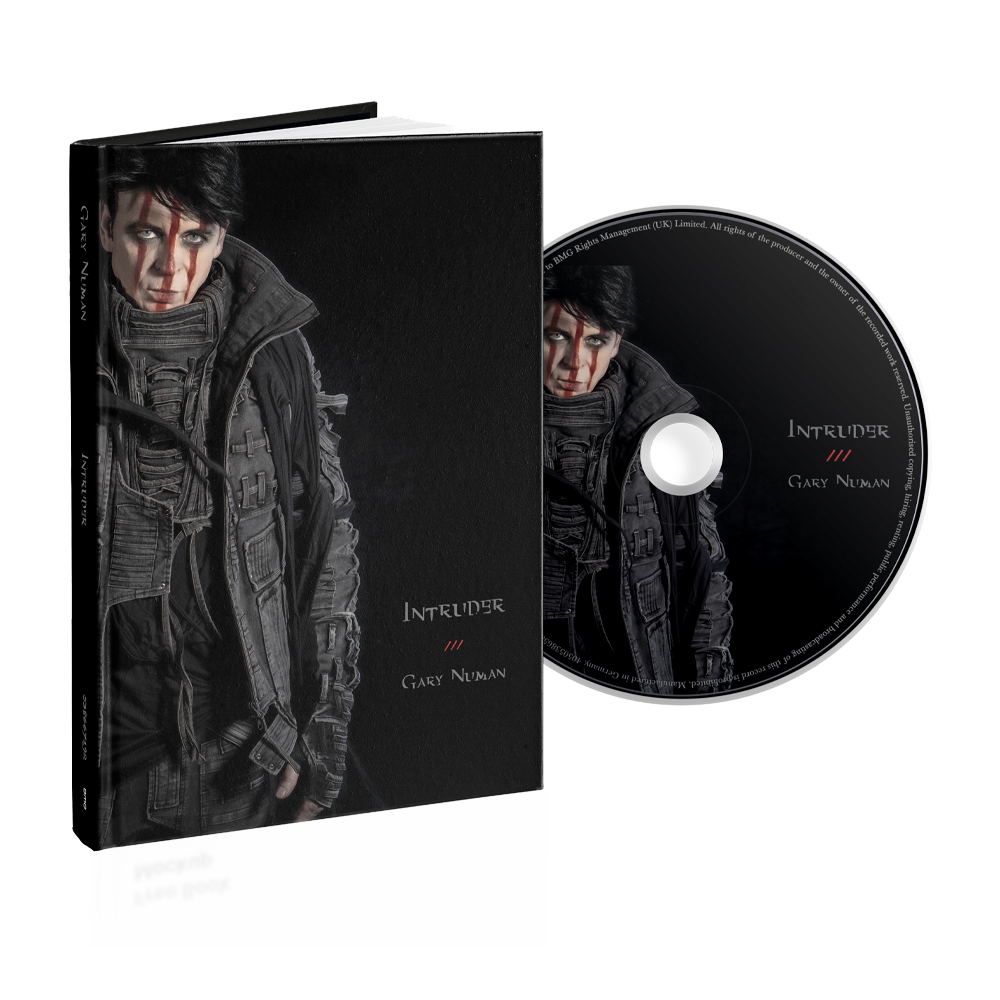
Gary Numan
deluxe CD with bonus track
Compare prices and pre-order

Gary Numan
The Intruder - 2LP black vinyl

|
|
||||||||||||||||||||||||||||||||||||||||||||||||||||||||||||
Compare prices and pre-order

Gary Numan
The Intruder - standard CD

|
|
||||||||||||||||||||||||||||||||||||||||||||||||||||||
Tracklisting
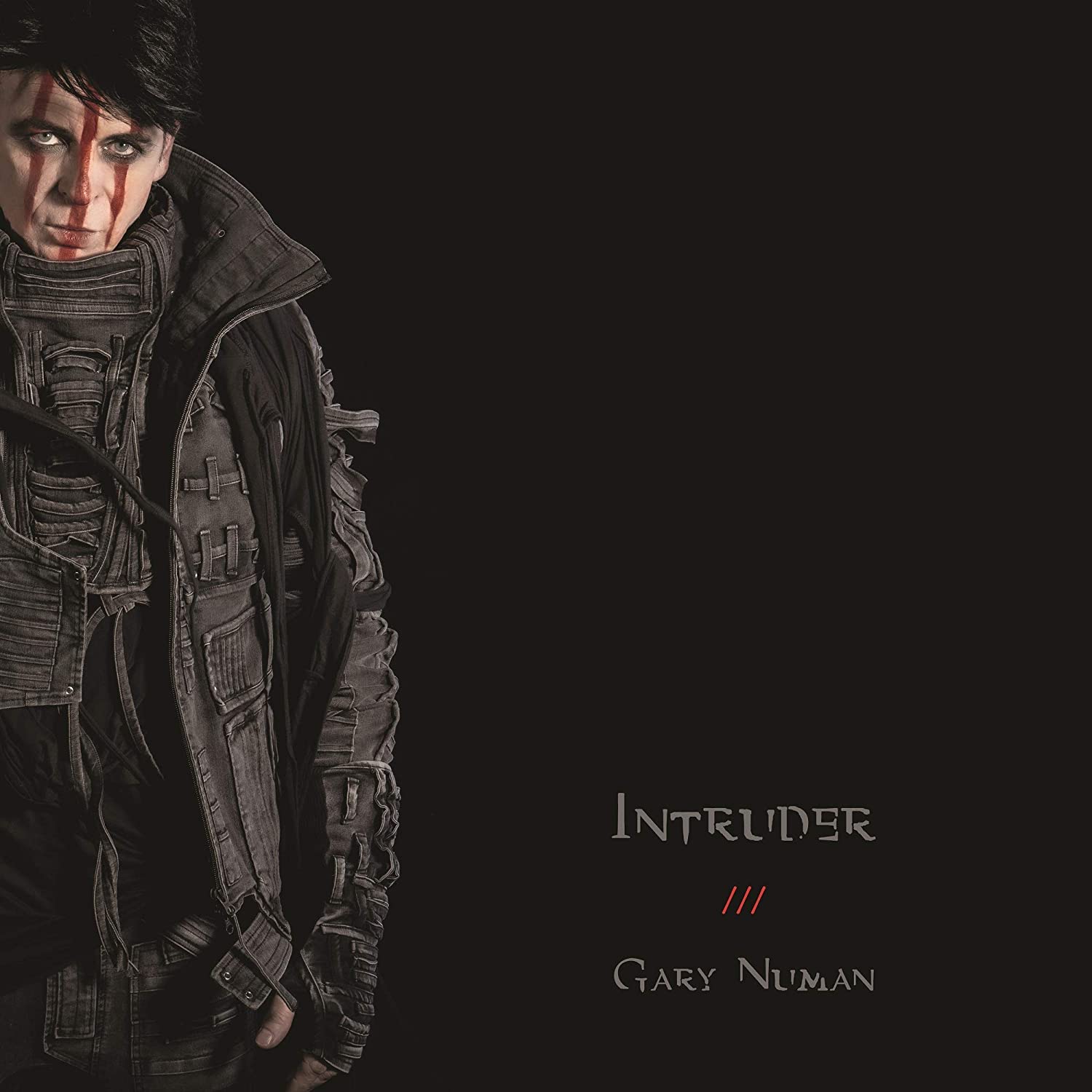
Intruder European Tour Dates 2021 Gary Numan /
-
-
April 2022
- 28th – UK, Cardiff, The Great Hall
- 30th – UK, Bristol, O2 Academy
-
May 2022
- 1st – UK, Brighton, Centre
- 2nd – UK, Birmingham, O2 Institute
- 5th – UK, Bournemouth, O2 Academy
- 6th – UK, Plymouth, Pavilions
- 7th – UK, London, The SSE Arena, Wembley
- 9th – UK, Edinburgh, Corn Exchange
- 10th – UK, Glasgow, O2 Academy
- 11th – UK, Newcastle, O2 City Hall
- 12th – UK, Leeds, O2 Academy
- 14th – UK, Northampton, Royal & Derngate
- 15th – UK, Norwich, UEA
- 16th – UK, Nottingham, Rock City
- 18th – UK, Manchester, Albert Hall
- 20th – UK, Sheffield, O2 Academy
- 21st – UK, Belfast, Ulster Hall
- 24th – Ireland, Dublin, Olympia Theatre
- 26th – The Netherlands, Amsterdam, Melkweg
- 27th – Denmark, Aarhus, Train
- 29th – Denmark, Copenhagen, Amager Bio
- 30th – Norway, Oslo, John Dee
- 31st – Sweden, Malmo, Kulturbolaget
-
June 2022
- 2nd – Germany, Berlin, Columbiahalle
- 7th – France, Paris, Le Cabaret Sauvage
- 10th – Spain, Madrid, Sala But
- 11th – Spain, Barcelona, Razzmatazz Room 2
- 13th – Belgium, Brussels, Ancienne Belgique
-
April 2022

 Interview
Interview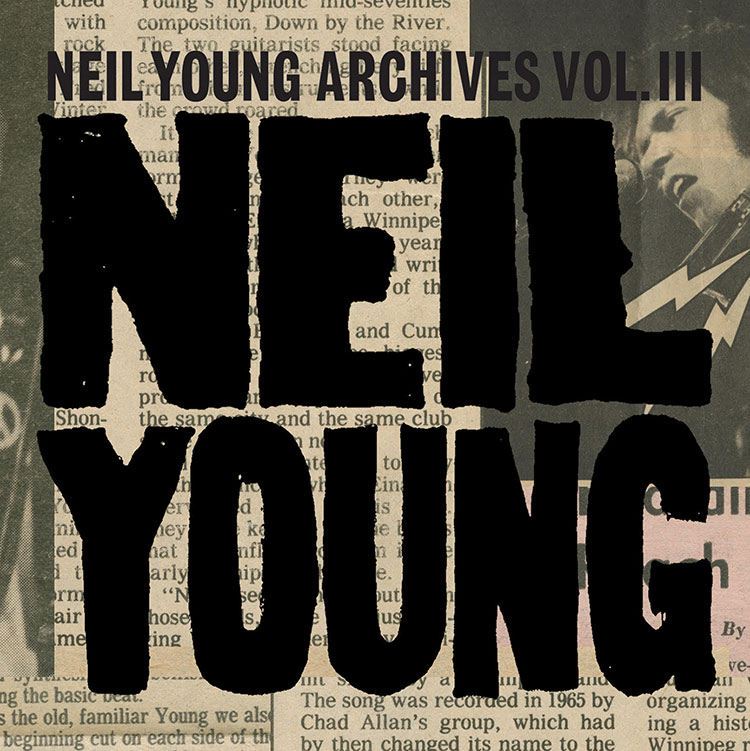
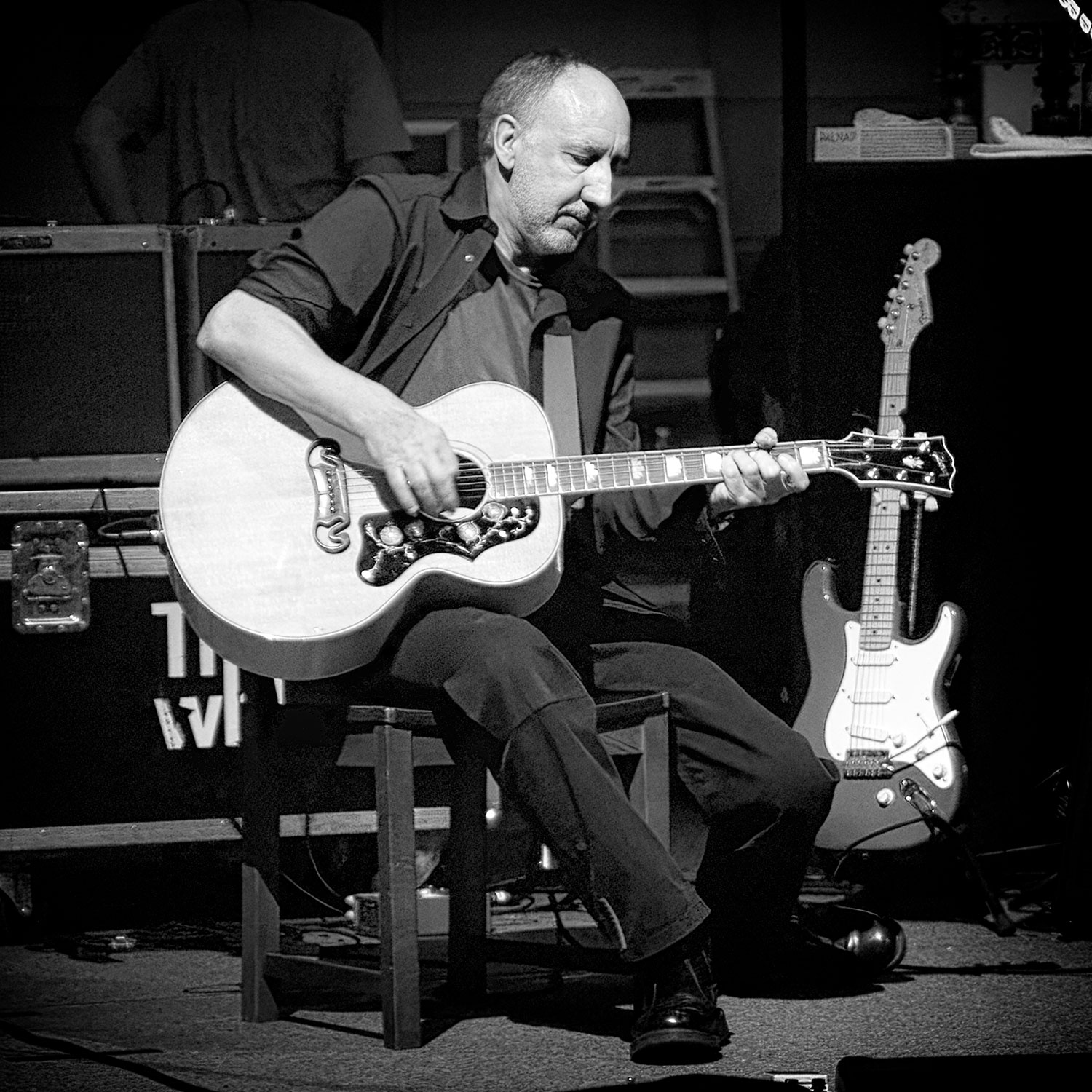
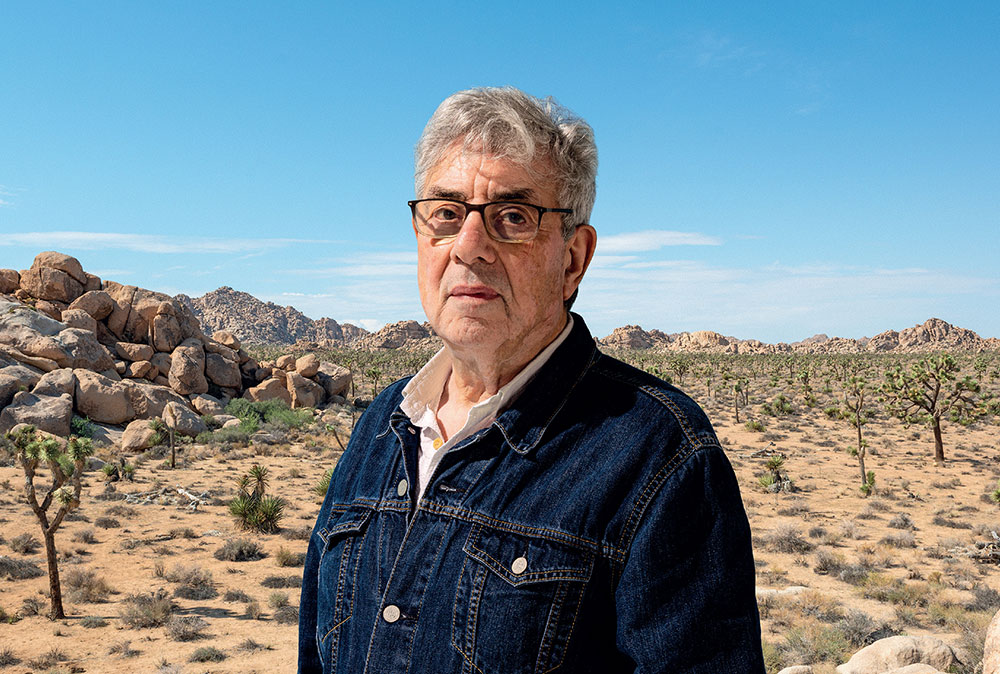
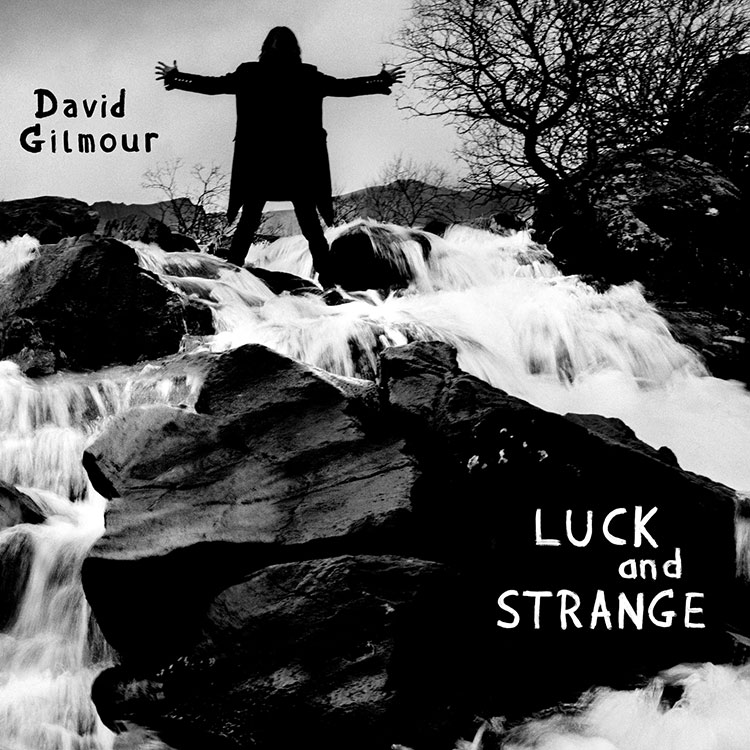
By John Earls
13